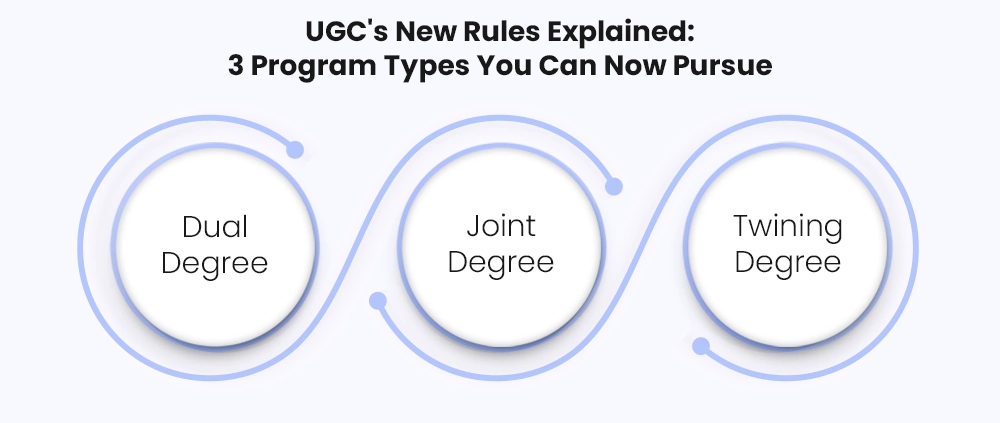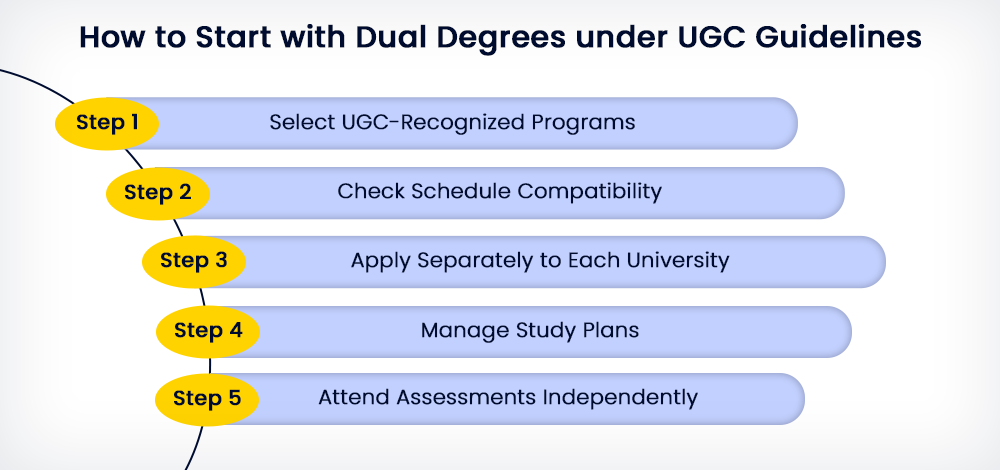Have you ever heard about dual degree programs and wanted to get complete information about them? This blog has all the data that you need to know regarding dual degree education in India and how you can utilize this beneficial opportunity to pursue a dual degree from the same or different universities at the same time.
The University Grants Commission (UGC) has laid down various regulations and guidelines regarding the dual degree, twinning degrees, and joint degree programs with Indian and foreign universities. We will be discussing all of them in detail, but let us first understand what a dual degree program is.
What is a Dual Degree Program?
A dual degree or a double degree program means that a student can pursue two different degrees from either the same university or two different universities, or even from two different countries, but at the same time. The two degrees may or may not be in the same subject area.
For example, suppose you pursued business and journalism in a dual degree program. In that case, you will graduate with two degrees in hand- a Bachelor of Business Administration (BBA) degree and a Bachelor of Arts (BA) in Journalism degree respectively.
The foremost reason is that you save a lot of time. You spend less time than it would have taken when you pursued 2 degrees separately. You gain knowledge of different specialisations/subjects, which makes you a multi-talent and hence gives you an edge over others.
However, you must not confuse a dual degree with a dual major or integrated courses. All three are different. Continue reading till the end to find out these subtle but important differences.
UGC Guidelines for Pursuing a Dual Degree
According to the National Education Policy (NEP) 2020, the education pedagogy must evolve in order to make education more holistic, experimental, integrated, flexible, discussion-based, learner-centered, and enjoyable as well.
The objective is to offer flexible curricular structures for students to be creative and practical in their approach towards education. Different areas of study will help students with multiple career options and help with employment in the country.
The following are the guidelines for pursuing dual degrees in India:
- A learner can pursue two full-time academic degrees (offline) provided that the class timings for one course do not coincide with those of the other course.
- Students can pursue dual degrees in the following modes:-
- Both are full-time offline courses.
- One full-time offline course and the other in online mode or Open and Distance Learning (ODL) mode.
- Both courses are in online mode or Open and Distance Learning (ODL) mode.
- The degrees pursued in the ODL or online mode must be from those institutions only that are UGC/Statutory Council/Govt. Of India recognised.
All the above guidelines are for the undergraduate and postgraduate degrees only and not for Ph.D. programmes. Earlier, dual degree programs were available but only within India. You could pursue two separate degrees from two separate Indian universities.
However, with this recent UGC notification, students will be able to pursue dual degrees from both India and abroad.

3 Types of Programs Permitted Under New UGC Regulations
The University Grant Commission (UGC) has permitted 3 types of programs, and they are as follows:
- Dual Degree: A dual degree entails obtaining two distinct degrees from the same university, or from one university and another, either at the same time or one after the other.
- Joint Degree: Here, the curriculum of the program is designed jointly by both Indian and Foreign universities. After the completion of the program, the degrees will be offered by both universities but in a single certificate.
- Twinning Degree: Here, a part of the course is completed at the Indian University and the other part at a foreign university. Only the Indian University will offer the degree in this case. The credit distribution will be no more than 30% from the Foreign university and the rest from the Indian university.
This move by the UGC has made it easy for Indian students to study abroad and earn a foreign university degree. However, there are certain guidelines for pursuing dual degrees from foreign universities.
- The dual degree programme will be designed together by the Indian university and the partner foreign university. Students will receive two separate degrees, one from each university.
- The two degrees must be in the same disciplines/subjects and also at the same level.
- The students must meet the eligibility criteria of both the Indian and foreign universities for admission.
- Out of the total credits, students must earn at least 30% from the Indian university. The rest credits to be earned from the foreign university shall be obtained through the conventional mode.
- In case of Ph.D. courses, the students should have a mentor/supervisor at each of the two universities.
Best Integrated Courses (Regular Mode)
There are so many integrated programs out there because of the sudden popularity. Many prestigious universities have come up with numerous dual-degree programs because of an upsurge in students seeking these programs.
Some of the common and most in-demand dual degree programs (regular mode) for students who have just completed their 12th grade are:
- Bachelor of Technology (B.Tech) + Master of Technology (M.Tech)
- Bachelor of Engineering (BE) + Master of Engineering (ME)
- B.Tech/BE + Master of Science (MS)
- B.Tech/BE + Master of Business Administration (MBA)
And Many More!
Students who possess higher academic qualifications than the 12th standard certificate can opt for the following dual degree programs:
- Bachelor of Education (B.Ed) + Master of Education (M.Ed) Integrated Course
- Master of Pharmacy (M.Pharm) + Master of Business Administration (MBA) Integrated Course
- Master of Science (M.Sc) + Ph.D. Integrated Course
And more, depending upon your area of study.

Dual Degree Under UGC 2022 Guidelines (Within India)
The UGC now permits students to enroll in two academic programs at once, offering flexibility in their learning methods. These are not joint programs among universities; instead, they represent the individual degree efforts of a student enrolled in two Indian universities or institutions.
Permissible Combinations:
- One Regular + One Online
- One Regular + One Distance
- One Online + One Distance
- Two Online Programs
- Two Distance Programs
(Not Allowed: Two Regular Degrees in offline mode from different universities at the same time.)
Conditions:
-
Both programs must be from UGC-recognized universities/institutions.
-
Time schedules should not clash (especially if one is regular).
-
Students must ensure they can handle the academic load.
Is Dual Degree the same as Integrated Courses?
An integrated course is one type of dual degree program. There are a few key differences that make an integrated course a little different from other dual degree programs.
In a dual degree program, you can opt for two separate degrees but only of the same level. This means that both degrees must be either bachelor’s or master’s. For example, you can not opt for a BCA and an MBA degree together.
On the other hand, an integrated course means you can opt for one UG and one PG degree together. The only limitation is that both degrees should be in the same or related fields. For example, you can pursue a B.Tech in Computer Science and an M.Tech in Cyber Security together as an integrated course.
Top Dual Degree Colleges In India 2026
Some of the top institutions in India have started offering dual degree courses, as it has become quite popular recently. Not just the popularity, but the great potential of this program has made the following top institutions offer these dual degree courses.
| Top Dual Degree Colleges In India 2026 | ||







